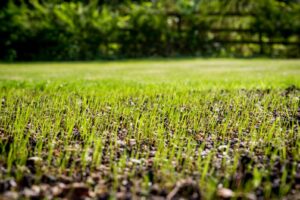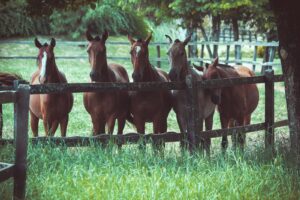
Creating a healthy, productive pasture for horses is about more than just planting any type of grass—it requires selecting specific pasture seeds that provide essential nutrition, stand up to grazing, and ensure a safe environment for your equine friends. The right pasture seed can make a big difference in supporting your horse’s health, and it can help maintain the quality of your pasture long-term. Here’s what you need to know to make the best seed choices for a well-balanced, thriving horse pasture.
What to Look for in Horse Pasture Seeds
When selecting pasture seeds for horses, looking for grasses and plants that meet several key criteria is essential. The best pasture seeds are:
- Nutrient-Rich: Horses need a nutrient-dense diet, even when grazing. The right pasture seed should offer an appropriate balance of protein, fiber, and energy without excessive sugars or starches.
- Palatable and Digestible: Horses are selective grazers, so choosing palatable grasses ensures they’ll actually eat what’s growing in their pasture. Additionally, high-fiber options support healthy digestion and help avoid digestive issues.
- Resilient and Durable: Horses are heavy grazers, and their hooves can be tough on plant life. Choosing hardy, durable grass varieties that regrow quickly can help keep your pasture lush and healthy.
- Low in Sugars and Fructans: Certain grasses can be high in sugars, which might not be suitable for all horses, especially those prone to conditions like laminitis. Avoiding high-sugar varieties ensures safer grazing, particularly for horses with metabolic issues.
Top Grass Varieties for Horse Pastures
Not all grasses are created equal when it comes to horse grazing. Here are some of the best options from Nature’s Seed for establishing a safe and nutritious pasture for your horses:
1. Timothy Grass
Timothy grass is a classic choice for horse pastures due to its excellent nutritional profile and palatability. It’s a cool-season grass that grows well in a range of climates, offering horses a steady source of protein and fiber. Timothy grass has a moderate growth rate and can be cut for hay as well, making it a versatile choice for horse owners who want a multi-purpose pasture.
2. Orchardgrass
Orchardgrass is another popular cool-season grass that’s well-suited for horses. It grows in dense clumps, making it more resistant to foot traffic and overgrazing. Orchardgrass provides a good balance of protein and fiber without high sugar content, making it safe and digestible. It’s also shade-tolerant, which can benefit pastures with trees or partially shaded areas.
3. Kentucky Bluegrass
Kentucky bluegrass is known for its ability to withstand heavy grazing, thanks to its dense growth and deep root system. This cool-season grass provides a lush, green appearance and is highly palatable for horses. Kentucky bluegrass has lower protein and sugar levels, ideal for horses requiring a more controlled diet. It’s also a great option for pastures in cooler regions, as it thrives in cooler weather.
4. Perennial Ryegrass
Perennial ryegrass is fast-growing and can establish quickly, making it a good option for overseeding existing pastures or repairing worn areas. However, choosing low-fructan ryegrass varieties is essential, as some types of ryegrass can have high sugar content. With careful selection, perennial ryegrass can add durability and nutrition to a pasture, especially when mixed with other grass types.
5. Tall Fescue (Endophyte-Free)
Tall fescue is hardy and tolerant of many conditions, including drought and heavy grazing. However, it’s crucial to select endophyte-free tall fescue for horse pastures. Endophytes (fungi that live in certain grasses) can produce toxic compounds to horses, particularly pregnant mares. Endophyte-free tall fescue is safe for horses and provides a dense, resilient pasture option.
6. Bermudagrass
Bermudagrass is a top choice for horse pastures in warm climates. It’s a warm-season grass that thrives in heat and can tolerate drought, making it perfect for southern regions. Bermudagrass spreads quickly and forms a dense ground cover, which is ideal for preventing soil erosion and withstanding grazing pressure. It’s also low in sugar, making it suitable for horses sensitive to carbohydrates.
Creating a Well-Balanced Pasture Mix
While a single grass variety can work for some pastures, mixing several types of grasses often provides the best results. A well-balanced pasture mix includes a variety of seeds that cater to the nutritional needs of horses while ensuring resilience to grazing and climate conditions. For example, combining cool-season grasses like Kentucky bluegrass and orchardgrass with a warm-season option like Bermudagrass can provide a year-round grazing solution in warmer climates.
Adding legumes, such as clover, to the mix can also benefit the pasture. Clover is nitrogen-fixing, which enriches the soil and helps other plants grow more vigorously. However, using clover in moderation is essential, as some types can cause health issues in horses if overconsumed.
Tips for Establishing and Maintaining a Horse Pasture
Once you’ve chosen the right seed mix for your horse pasture, the next steps involve proper planting and care to establish a healthy, long-lasting grazing area:
- Prepare the Soil: Conduct a soil test to determine nutrient levels and make any necessary amendments. Horses graze closely to the ground, so soil health is crucial for supporting consistent, high-quality forage.
- Planting and Seeding: Plant in early spring or late summer for the best results, as this allows seeds to establish roots before extreme weather. For overseeding, lightly till the soil to improve seed-to-soil contact.
- Rotational Grazing: Horses can easily overgraze an area, so rotating grazing sections allows grass to recover. Consider creating separate grazing areas so that each section has time to regenerate.
- Weed and Pest Control: Weeds can outcompete grass, so monitor your pasture and remove weeds regularly. Additionally, avoid using pesticides or herbicides that could harm your horses.
- Fertilization: Fertilize according to the needs of your soil test, but be careful not to over-fertilize, as high-nitrogen levels can contribute to lush, high-sugar grasses that may not be ideal for all horses.
The Benefits of Choosing the Right Pasture Seed
Selecting the best pasture seeds for horse grazing has numerous benefits, from supporting horse health to creating a sustainable, low-maintenance pasture. Horses benefit from nutrient-dense, palatable grasses promoting good digestion and well-being. Meanwhile, durable and resilient grass types reduce the need for constant overseeding or repairs, saving you time and effort in pasture management.
With the right mix of pasture seeds, you can enjoy a healthy, thriving grazing area that supports your horses’ nutritional needs and withstands the demands of regular grazing. By investing in quality pasture seeds and following proper pasture management practices, you’re setting up a safe, productive, and beautiful space for your horses to enjoy.





